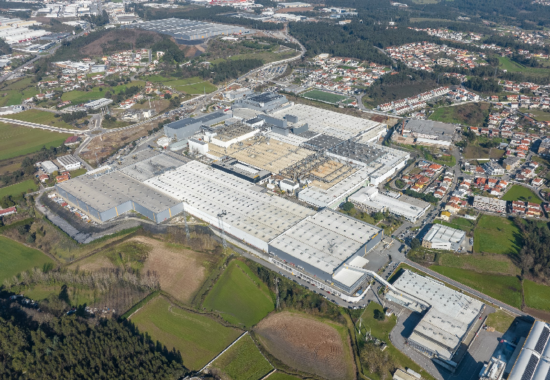Continental’s Portuguese tyre plant gets ISCC PLUS sustainability certification
 Continental’s tyre plant in Lousado, Portugal (Photo: Continental)
Continental’s tyre plant in Lousado, Portugal (Photo: Continental)
Continental’s tyre plant in Lousado, Portugal has received the International Sustainability and Carbon Certification (ISCC) PLUS. The international certification confirms the manufacturer’s compliance with special sustainability standards at its Lousado plant; specifically the transparency and traceability of renewable and recycled raw materials along the entire supply chain. The manufacturer said that the certification represents an important milestone on its journey towards 100 per cent sustainable materials in its tyre products, a target Conti has set for 2050. Conti already produces what it says is the most sustainable tyre on the market at Lousado. The UltraContact NXT contains up to 65 per cent renewable, recycled and mass balance certified materials. Up to 28 per cent of these are accounted for by ISCC PLUS-certified materials, such as synthetic rubber made from biobutadiene or industrial carbon black, parts of which are produced from circular oil.
Jorge Almeida, head of sustainability tyres at Continental (Photo: Continental)
“The certification underscores our strong commitment to more transparency along the entire supply chain, while enabling the introduction of new and more sustainable materials,” says Jorge Almeida, head of sustainability tyres at Continental. “We want to extend the internationally recognized ISCC PLUS certification to other of our tyre plants as well.”
The subject of the certification were the processes for the mass balance of raw materials. In the mass balance approach, fossil, renewable and recycled raw materials are mixed in existing systems and processes. Their quantities are tracked along the value chain and allocated to one or more initial products. The mass balance approach enables Continental to successively increase the proportion of sustainable materials in its products. It ensures that the proportion of certified sustainable materials can be precisely reported in the balance sheet.
Mass-balance-certified materials: synthetic rubber and carbon black
Continental UltraContact NXT (Photo: Continental)
The UltraContact NXT is the first series tyre for which Continental uses mass balance certified materials,for example, synthetic rubber made from bio-based and bio-circular raw materials or industrial carbon black, which is produced in parts from circular oil. In the production of synthetic rubber, butadiene derived from petroleum can be replaced by bio-based and bio-circular raw materials, thus enabling even more environmentally friendly tyre production. Pyrolysis of end of life tyres recovers oil, gas and carbon, among other things. The resulting oil is already being used for the production of industrial carbon black.
“The UltraContact NXT, our most sustainable tyre to date, is produced in Lousado. I am very proud of the performance of our team and the great progress we are making in the area of sustainability along the entire value chain, not only in our plant. Our successful ISCC PLUS certification is another example of that,” says Pedro Carreira, head of Conti’s Lousado plant.
ISCC PLUS is an internationally recognized voluntary certification system. It applies to the bioeconomy and circular economy and certifies non-conventional raw materials that can be used in, for example, food, feed, chemicals, plastics, packaging and textiles. The various criteria required for ISCC PLUS certification include traceability of raw materials, meeting environmental standards, protecting ecosystems, ensuring compliance with labor and human rights, and promoting sustainable economic development.
Pedro Carreira, head of Conti’s Lousado plant (Photo: Continental)
Conti’s intensive work to switch as many raw materials as possible in production to sustainable materials. It has identified many raw materials that could be used in tyre production in the future, including agricultural waste such as the ash from rice husks, rubber from dandelions, recycled rubber or PET bottles.
Read more on Continental’s Lousado plant in the October issue of Tyres & Accessories, and online in September.




 Apollo Tyres
Apollo Tyres

Comments